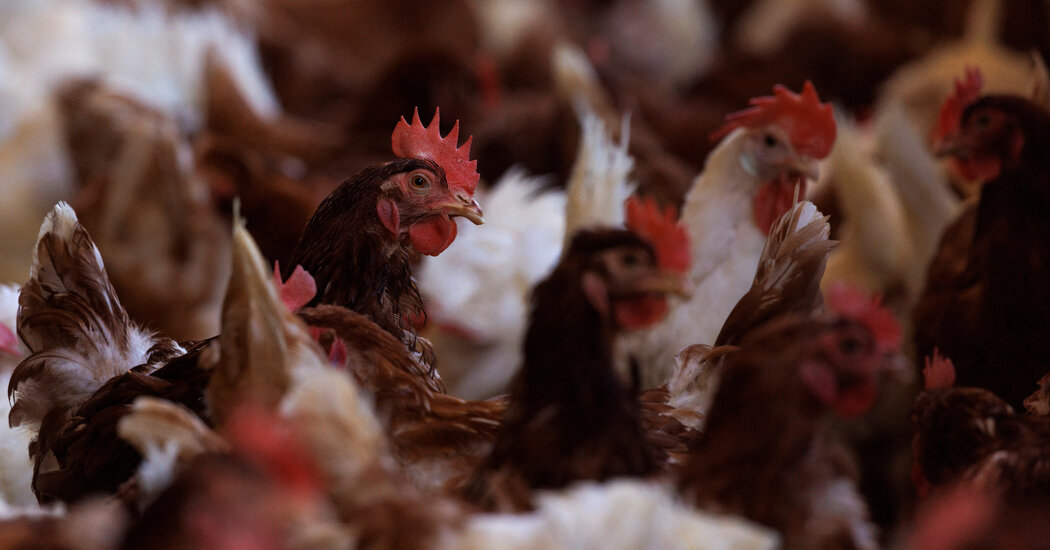U.S. Considers Vaccinating Chickens Amid Bird Flu Outbreak
The largest outbreak of avian influenza in U.S. history has driven up egg prices and raised concerns about a human pandemic, though C.D.C. experts say the risk of that is low.WASHINGTON — The Biden administration, keeping a watchful eye on an outbreak of avian influenza that has led to the deaths of tens of millions of chickens and is driving up the cost of eggs — not to mention raising the frightening specter of a human pandemic — is contemplating a mass vaccination campaign for poultry, according to White House officials.The bird flu outbreak, which began early last year, is the biggest in the nation’s history, affecting more than 58 million farmed birds in 47 states, as well as birds in the wild. It has already spilled over into mammals, such as mink, foxes, raccoons and bears, raising fears that the virus that causes it, known as H5N1, could mutate and start spreading more easily among people.Experts at the Centers for Disease Control and Prevention, whose focus is human health, say the risk of a pandemic is low. As a precaution, the agency has sent drug manufacturers flu virus samples that could form the basis of vaccines for people. The C.D.C. is also exploring whether commercial test manufacturers would be willing to develop tests for H5N1, similar to those used for the coronavirus.Bird flu infections in humans are rare, and transmission of bird flu between humans is extremely rare. Worldwide, there have been nine H5N1 cases reported in people since the beginning of last year, according to the World Health Organization. In Cambodia, an 11-year-old girl recently died from H5N1 and her father was also infected with it, though the virus was a different version than the one currently circulating in birds in the United States.Cases typically involve people exposed to poultry. In the United States, the C.D.C., in partnership with state and local public health departments, is monitoring people who are exposed to H5N1. As of last week, 6,315 people had been monitored; 163 reported symptoms; and one tested positive, according to Dr. Tim Uyeki, the chief medical officer of the C.D.C.’s influenza division.At the same time, officials at the federal Agriculture Department, which is responsible for the health of farm animals, say they have begun testing potential poultry vaccines and initiated discussions with industry leaders about a large-scale bird flu vaccination program for poultry, which would be a first for the United States.Farm birds are already vaccinated against infectious poultry diseases, such as fowlpox. But an avian influenza vaccination program would be a complex undertaking, and poultry trade associations are divided over the idea, in part because it might spawn trade restrictions that could destroy the $6 billion poultry export industry. Dr. Carol Cardona, an expert on avian health at the University of Minnesota, said that the fear of trade bans was a huge barrier to the mass vaccination of poultry.“This is the undeclared war — trade,” Dr. Cardona said.Avian influenza experts, however, say they believe the Biden administration should move ahead with a vaccination campaign, in part to reduce the risk of a human pandemic. In interviews, several called for the administration to act quickly.“My own opinion is under the present circumstances, we should be vaccinating the poultry population of the United States against H5N1 — absolutely,” said Robert G. Webster, an expert in avian influenza at St. Jude Children’s Research Hospital in Memphis. Such a campaign could “prevent the inevitable transmission to humans,” he said.For President Biden, there are also political considerations at work. Egg prices, which soared in 2022, were 70 percent higher in January than they were a year earlier. Those high prices have given Republicans another opportunity to attack Mr. Biden over inflation just as he is preparing to run for re-election in 2024.What to Know About Avian FluCard 1 of 6The spread of H5N1.
Read more →
